
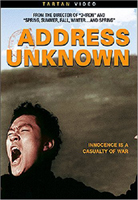 BUY IT AT AMAZON: CLICK HERE!
BUY IT AT AMAZON: CLICK HERE!
STUDIO: Tartan Video
MSRP: $24.99
RATED: R
RUNNING TIME: 126 Minutes
SPECIAL FEATURES: Interview and intro with dir. Kim Ki-duk
The Pitch
"Did
you know that Americans are still stationed in
The Humans
Yang
Dong-kun, Ban Min-jung, Kim Young-min
The Nutshell
Guess what!
Korea
entirely of high-concepts; it’s not all hallway fight scenes, teenage
prostitutes, and smile-more businessmen. Out in the mean country sides, there
are villages whose inhabitants scrape out meager and un-exciting lives by
selling butchered dogs to stew shops, or collecting government pensions on
husbands who died in the war.
And right alongside this village of unhappy souls
squats an American military base whose inhabitants say "fuck" a lot
and occasionally do it. When one bad boy from the American side of the tracks
does his best to infiltrate one of the Korean girls, there’s not a person in
the village left without an opinion — boldly expressed — about the American
presence in general, and the young soldier’s in particular.
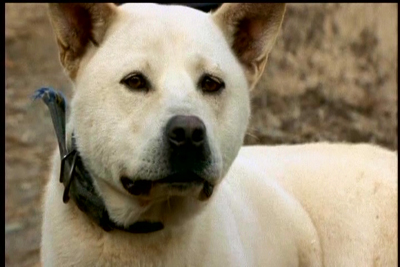
oh god oh god i am not going to survive this movie
The
Lowdown
According to director Kim Ki-duk, Address
Unknown is an agenda flick. In his introduction to this Tartan release
of his film, he says that he hopes it will speak to American audiences
specifically and edify them about situations that are beyond normal media
scope. His agenda, as stated, is awfully broad, and may as well have been,
"I intend to make compelling cinema," because that’s what he ends up
doing.
Address Unknown is
less a condemnation of American colonialism and more a treatise on karma. In a
small community, karma isn’t an abstract religious concept, it’s a practical philosophy.
(It’s also being defined by this reviewer as the overly simplistic "what
goes around comes around," which isn’t strictly accurate.) When everybody
knows everyone, and no secrets remain hidden, it’s hard for retribution to take
any other form than the justice of the people on display throughout the film.
The little village is portrayed as a scummy sort
of place to live, so it’s not hard to imagine the circle of escalation that
forms the bulk of the film’s momentum. In a place where cute li’l doggies are
suspended from nooses and beaten to a pulp with a baseball bat, and then sold
to eateries, it’s not hard to believe the common brutality of the people’s
lives, which is expressed in beatings, rapes, and light murder of childhood
ideals. (There’s also more dogs and dog-related philosophies than you’ll find
anywhere this side of Amores Perros.)
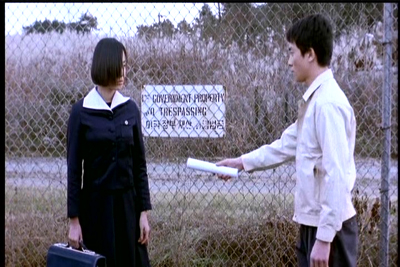
"Seriously, you’re the worst relay runner ever."
What kind of people live in this world? Surly
people. Surly, archetypal people. Kim
has proven himself a dab hand with the ol’ character creation, but that’s not
his goal this time out. For a very specific reason (which I will tease you with
now and revisit later,) Kim wants to use characters that are no more than
sketches. For a good three-fourths of the running time, not one of them has
much depth beyond their actions. They are bitter, doomed, and bitterly
humorous; and there are enough of them to keep the action going at a steady
clip.
It’s not hard to get caught up in the action,
depressing as it might be, but the difficulty lies in uncovering the rewarding
aspects of a film that could conceivably be written off as an exercise in
sadism. I suspect this is especially difficult for an American audience, like
yours truly, not because of any sort of nationalistic outrage at the portrayal
of Americans, but because we don’t fully understand the effects of colonialism,
since it hasn’t been practiced on us in our lifetimes.
Nevertheless, Address Unknown rewards at least an
effort toward objectivity, even if the ideal can’t be attained. It’s too easy
for us to fall into a sort of sympathy, or something lockstep with sympathy,
with the Americans in the film if for no other reason than they’re the only
ones we can understand without subtitles. So, the effort for an audience of my
peers is in distancing themselves from the familiar, in seeing the Americans as
a presence of "others."
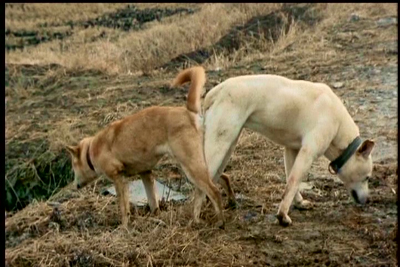
For those of you not raised on a farm, these dogs are playing. Got it? Playing.
Now git inside and help yer mother with them dishes.
When you’ve got that down, you end up with a movie
that is heavily metaphorical, hedging on allegorical. The village and the
military base become a sort of microcosm of the world, wherein violence begets
only violence, and individuals self-destruct as much as they are struck down.
That’s why the characters are archetypes — they’re representational, to a
degree, of different philosophies of diplomacy, pacifism, and other fated
ideas.
Metaphor-heavy stories don’t play so well to most
audiences, because they don’t provide justifications for certain actions beyond
a cowardly retreat to, "Well, think of it like this." (Matrix sequels are gross offenders
in this regard.) Kim avoids that pitfall by creating not so much an agenda with
Address
Unknown as a series of pointed observations. The metaphors aren’t
stretches of the imagination; they’re natural and thoughtful, and couched in a story
that’s depressing as hell and savagely avoids redemption.
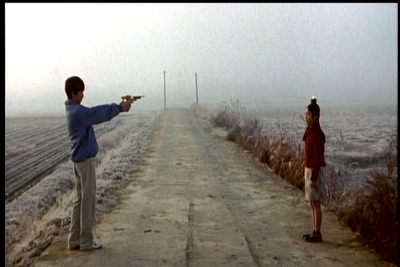
"We didn’t have apples, so I just had to paint a target on your face.
Don’t worry, I’ll aim high."
The Package
There’s
an introduction by Kim, in which he declares his agenda for the film, and then
an interview with him, in which he explores that same agenda. The interview is
fascinating — the man has the emotional vocabulary to back his claims up, even
if he doesn’t have the same forcefulness when talking politics — but brief.
There are
two soundtracks provided: DTS and Dolby. This isn’t exactly the sort of film
you’d use to show off your new, credit card-funded sound system, but the DTS
track sounds great. You can really hear the dogs’ ribs cracking with each swing
of the baseball bat.
7 out of 10